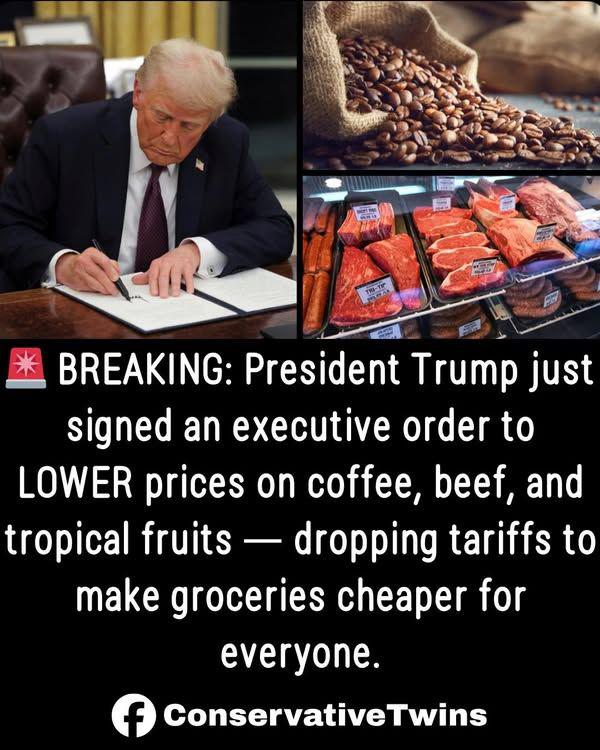CELEBRITY
BREAKING: President Trump Just SLASHED Tariffs on Coffee, Beef, and Tropical Fruits — Executive Order Aims to Cut Soaring Grocery Prices for American Families

In a surprise move that sent shockwaves through global markets and immediate ripples across the U.S. food industry, President Donald Trump signed an executive order early Friday slashing federal tariffs on coffee, beef, and a wide range of imported tropical fruits.
The administration says the decision is designed to bring immediate relief to American families hammered by rising grocery prices.
The White House described the order as “a direct strike against inflation inside American kitchens.”
A Bold Economic Play
The sudden tariff reduction — which takes effect within 14 days — targets three of the fastest-inflating grocery categories:
Coffee
Beef and beef by-products
Tropical fruits including bananas, mangoes, pineapples, papayas, and avocados
According to internal administration estimates released this morning, the policy could cut retail prices in these categories by 8% to 18% over the next two months, depending on supply chain speed.
Standing in the East Room, President Trump declared the order a “major win for the American wallet.”
> “Families shouldn’t have to choose between paying bills and putting good food on the table,” Trump said. “We’re eliminating unnecessary tariffs that make groceries more expensive. This is about fairness, relief, and putting America’s consumers first.”
Industry Reactions Pour In
Economists and market analysts reacted quickly, noting that tariff adjustments on food commodities can have immediate and visible effects on household spending.
Food industry groups, particularly importers and distributors, welcomed the decision, calling it a “smart, targeted move that benefits both businesses and consumers.”
Coffee roasters — who have struggled under fluctuating global bean prices — celebrated the announcement. One major distributor told reporters:
> “Lower tariffs mean lower wholesale costs. Consumers should see the difference quickly.”
Cattle industry representatives, however, offered mixed reactions. Domestic beef producers argue the tariff cuts could increase competition from foreign suppliers, while large grocery chains say the resulting price drops will be “significant and badly needed.”
Why These Products?
White House advisors say the administration chose categories with:
High import dependency
High consumer demand
Rapid inflation rates in 2024–2025
Coffee prices surged more than 20% over the past 18 months, while beef and tropical fruit costs consistently outpaced overall grocery inflation. Lowering tariffs on these items, the administration argues, provides “fast, visible savings” to nearly all households.
Political Shockwaves
The executive order immediately set off political debate. Supporters praised the decision as “aggressive action against price gouging and inflation,” while critics argue the cuts could challenge U.S. agricultural interests and weaken domestic beef producers.
Still, early polls show strong public support. Grocery affordability has consistently ranked among Americans’ top three economic concerns.
What Happens Next?
Retailers are expected to adjust wholesale contracts immediately. Some grocery chains said they could begin lowering prices on tropical fruits and coffee within 3–4 weeks, while beef prices may take slightly longer due to existing supply-chain cycles.
If projections hold, the average American family could save $25–$45 per month on groceries by early 2026.
For millions of households stretched thin by inflation, the White House is hailing this as one of its most impactful pocket-book moves yet.













